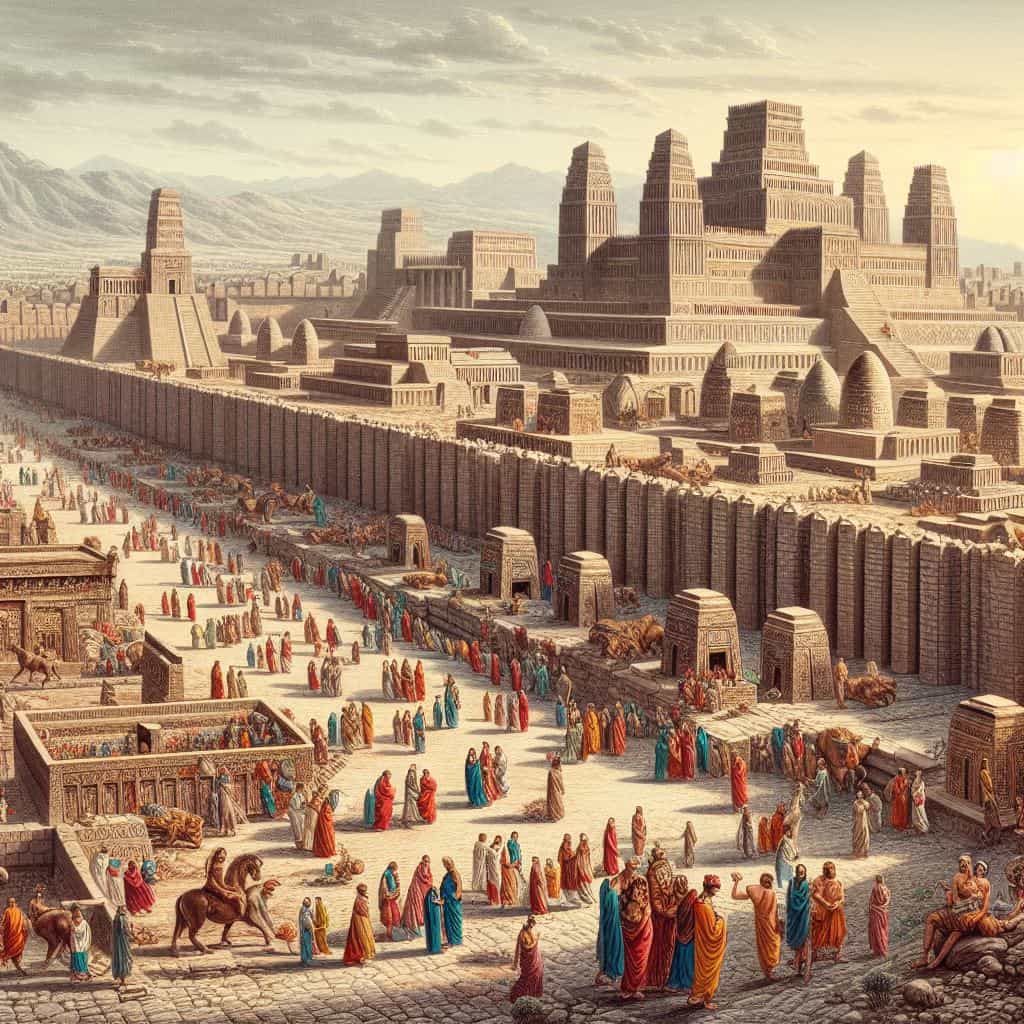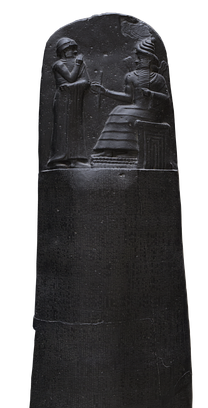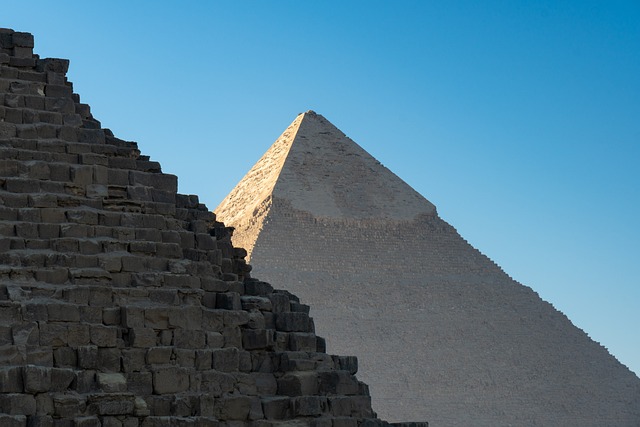The Flourishing City-States of Mesopotamia: Sumer, Akkad, and Babylon
Mesopotamia, frequently hailed as the “Cradle of Civilization,” stands as a region steeped in antiquity, boasting an array of remarkable city-states whose legacies endure through the annals of time. Among these illustrious centers, Sumer, Akkad, and Babylon emerge as prominent beacons of ancient greatness, each imprinting an indelible mark upon the tapestry of history through their sophisticated governance structures, profound cultural accomplishments, and invaluable contributions to the advancement of humanity.
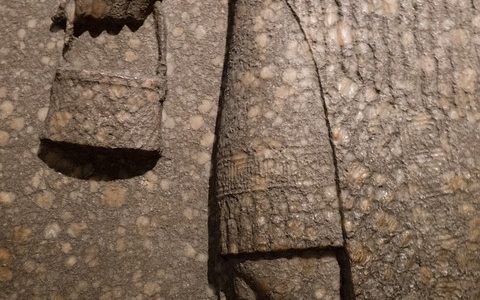
Sumer: The Cradle of Civilization
In the sun-drenched plains of Mesopotamia, where the Tigris and Euphrates rivers flow, lies the birthplace of civilization: Sumer. Flourishing between the fourth and third millennia BCE, Sumer was not a unified empire but rather a collection of independent city-states, each with its own distinct culture, language, and governance structure. Among the most renowned city-states were Ur, Uruk, Lagash, and Eridu, whose contributions to human civilization reverberate through the annals of history.
Advanced Urban Planning and Monumental Architecture
Sumerian city-states were characterized by their advanced urban planning and monumental architecture, which reflected the ingenuity and resourcefulness of its inhabitants. Cities such as Uruk boasted impressive ziggurats, towering temple complexes dedicated to the worship of the city’s patron deity. These architectural marvels served as focal points of religious life and communal gathering, symbolizing the spiritual and cultural vitality of Sumerian society.
Moreover, Sumerian cities were meticulously planned, with grid-like street patterns, bustling marketplaces, and intricate canal systems that facilitated trade, transportation, and agricultural productivity. The construction of levees, canals, and reservoirs enabled Sumerians to harness the fertile floodwaters of the Tigris and Euphrates, transforming arid landscapes into verdant fields of wheat, barley, and other crops.
Governance: Divine Kingship and Councils
At the heart of Sumerian governance lay the concept of divine kingship, wherein the ruler was believed to derive his authority from the gods. The king, often adorned with regal attire and symbols of divine favor, served as both the political and religious leader of the city-state, overseeing matters of statecraft, diplomacy, and religious ritual. The king’s authority was absolute, yet it was tempered by the counsel of elders and prominent citizens who comprised the city-state’s council.
These councils, composed of respected individuals from various social strata, provided invaluable guidance and expertise to the king, deliberating on matters of governance, law, and policy. Through consensus-building and collective decision-making, Sumerian city-states fostered a sense of civic participation and community cohesion, laying the groundwork for the emergence of democratic principles and representative government in later civilizations.
Contributions to Civilization: Writing, Law, and Science
The contributions of the Sumerians to human civilization are manifold, encompassing the fields of writing, law, mathematics, and astronomy. Foremost among their achievements was the invention of writing using cuneiform script, a system of wedge-shaped characters impressed onto clay tablets. Cuneiform writing facilitated record-keeping, administrative bureaucracy, and the dissemination of literature, poetry, and scientific knowledge across the ancient Near East.
In addition to their linguistic innovations, the Sumerians developed sophisticated legal codes, such as the Code of Ur-Nammu and the Code of Hammurabi, which codified principles of justice, equity, and social order. These legal codes delineated rights and responsibilities, regulated commerce and trade, and provided a framework for resolving disputes and adjudicating legal matters within Sumerian society.
Furthermore, the Sumerians made significant strides in mathematics and astronomy, devising mathematical concepts such as the base-60 numeral system and the division of the circle into 360 degrees. Their mathematical prowess facilitated advancements in commerce, architecture, and celestial navigation, laying the foundation for the development of more complex mathematical systems in subsequent civilizations.
Legacy and Influence
The legacy of Sumer endures as a testament to the boundless potential of human ingenuity and innovation. From its fertile plains emerged a civilization that defied the constraints of time, leaving behind a legacy that continues to inspire awe and admiration. As we marvel at the remnants of ancient cities and decipher the inscriptions of clay tablets, we are reminded of the enduring legacy of Sumer, the cradle of civilization whose influence reverberates through the corridors of history.
Akkad: The Empire of Sargon
In the annals of ancient Mesopotamian history, the rise of Akkad under the leadership of Sargon the Great stands as a testament to the ambition and military prowess of one of history’s most formidable rulers. Established in the 24th century BCE, the Akkadian Empire heralded a new era of centralized authority and imperial expansion, reshaping the political and cultural landscape of the ancient Near East.
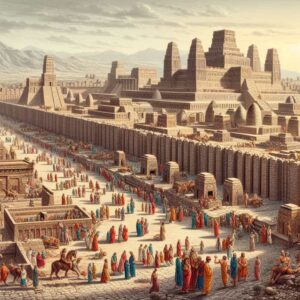
The Rise of Sargon and the Akkadian Empire
At the dawn of the third millennium BCE, Sargon, a former cupbearer to the king of Kish, ascended to power through a series of military conquests and strategic alliances. With unparalleled ambition and vision, Sargon sought to unify the disparate city-states of Mesopotamia under a single banner, forging the Akkadian Empire in the crucible of conflict and conquest.
Under Sargon’s leadership, the Akkadian Empire expanded its territorial reach, stretching from the Persian Gulf to the Mediterranean Sea, encompassing vast swathes of fertile land and strategic trade routes. Through a combination of military might and diplomatic cunning, Sargon and his successors established a hegemonic empire that commanded respect and awe throughout the ancient world.
Governance: Centralized Authority and Imperial Administration
Unlike the decentralized governance of Sumerian city-states, the Akkadian Empire was characterized by a strong central authority, with Sargon and his successors wielding absolute power over the affairs of state. Governors, appointed by the emperor, were tasked with overseeing the administration of various regions and provinces, ensuring the enforcement of imperial edicts and the collection of taxes and tributes.
Akkadian rule was marked by the establishment of a standing army, comprised of professional soldiers and elite warriors, whose primary purpose was to maintain order and security across the empire. Military garrisons were strategically stationed at key junctures, fortifying imperial borders and deterring potential threats from rival city-states and nomadic tribes.
Contributions to Mesopotamian Civilization
The Akkadians made enduring contributions to Mesopotamian civilization, leaving an indelible mark on the cultural, linguistic, and economic fabric of the ancient Near East. Perhaps most notably, the spread of Akkadian as a lingua franca facilitated communication and commerce across diverse linguistic and cultural boundaries, fostering cultural exchange and intellectual innovation.
Moreover, the Akkadians further developed the cuneiform writing system, refining its script and expanding its repertoire of symbols and signs. Cuneiform inscriptions adorned clay tablets and monumental steles, serving as a medium for recording historical narratives, legal codes, and administrative decrees. The proliferation of written texts facilitated the dissemination of knowledge and wisdom, preserving the collective heritage of Mesopotamian civilization for future generations.
Furthermore, the Akkadians played a pivotal role in expanding trade networks and fostering economic growth and prosperity. Through strategic alliances and commercial partnerships, the Akkadian Empire became a nexus of trade and commerce, linking the riches of the Mediterranean world with the bounty of the Mesopotamian heartland.
Conclusion: The Legacy of Akkad
In conclusion, the Akkadian Empire stands as a testament to the ambition, vision, and ingenuity of Sargon the Great and his successors. Through conquest and consolidation, the Akkadians forged an empire that left an indelible imprint on the tapestry of human history, shaping the destiny of civilizations for centuries to come. As we reflect on the legacy of Akkad, we are reminded of the enduring power of human ambition and the transformative impact of empires on the course of human civilization.
Babylon: The Cradle of Power and Culture
Nestled along the banks of the majestic Euphrates River, Babylon emerged as a beacon of civilization and splendor during the 18th century BCE. From its humble beginnings as a modest city-state, Babylon burgeoned into the capital of a vast empire under the visionary rule of Hammurabi. Renowned for its majestic architecture, enduring legal code, and cultural achievements, Babylon left an indelible mark on the annals of human history.
Emergence of Babylon: Urban Marvels and Trade Hub
Babylon’s ascent to prominence began amidst the fertile plains of Mesopotamia, where it blossomed into a thriving urban center renowned for its bustling markets, towering ziggurats, and cosmopolitan atmosphere. Situated along vital trade routes that linked the ancient civilizations of the Near East, Babylon became a hub of commerce, culture, and intellectual exchange. Merchants, artisans, and scholars from diverse backgrounds congregated within its walls, fostering a vibrant and dynamic society.
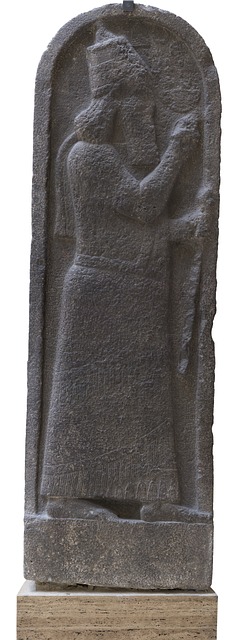
Governance: Hammurabi’s Legacy of Law and Order
Under the enlightened rule of Hammurabi, Babylonian governance underwent a transformational renaissance, marked by the codification of laws and the establishment of a centralized legal system. Hammurabi’s enduring legacy lies in the Code of Hammurabi, a monumental legal codex inscribed onto a stele, which provided a comprehensive framework for justice, equity, and social order within Babylonian society.
The Code of Hammurabi encompassed a wide array of legal statutes governing various aspects of daily life, including commerce, marriage, property rights, and criminal justice. Its principles sought to promote fairness, deter crime, and uphold the rights and responsibilities of individuals within the empire. Moreover, Hammurabi implemented administrative reforms, dividing the empire into provinces governed by appointed officials, thus ensuring efficient governance and centralized authority.
Contributions to Civilization: Mathematics, Literature, and Astronomy
Babylonians made enduring contributions to human civilization in diverse fields, including mathematics, literature, and astronomy, which continue to inspire awe and admiration to this day. In the realm of mathematics, Babylonians refined numerical concepts such as the base-60 numeral system, which laid the foundation for the measurement of time, angles, and geometric calculations. Their mathematical prowess enabled advancements in commerce, architecture, and celestial navigation, shaping the course of scientific inquiry for centuries to come.
Literature flourished in Babylon, giving rise to timeless literary works such as the Epic of Gilgamesh, one of the world’s oldest surviving literary texts. This epic narrative, with its themes of friendship, mortality, and the quest for meaning, captivated the hearts and minds of generations, offering profound insights into the human condition and the pursuit of transcendence.
Furthermore, Babylonian astronomers made significant strides in the observation and recording of celestial phenomena, developing sophisticated methods for predicting lunar and solar eclipses, charting the movements of the planets, and mapping the stars. Their astronomical observations laid the groundwork for later scientific discoveries and contributed to the development of cosmological theories and mathematical models.
Legacy and Influence: Reflections on Babylon
As we reflect on the legacy of Babylon, we are reminded of the enduring power of human creativity, ingenuity, and aspiration. From its humble origins as a city-state to its zenith as the capital of a mighty empire, Babylon stands as a testament to the indomitable spirit of human endeavor. Its contributions to civilization, in the realms of governance, culture, and science, continue to shape the contours of our shared heritage and collective identity. As we gaze upon the remnants of its towering ziggurats and ponder the wisdom of its legal code, we are invited to contemplate the timeless lessons of Babylon, the cradle of power and culture in the ancient world.
Conclusion
The city-states of Sumer, Akkad, and Babylon played pivotal roles in shaping the course of human history in ancient Mesopotamia. From the birth of writing and the development of legal codes to the construction of magnificent cities and the establishment of vast empires, their legacies endure as testament to the ingenuity and creativity of the ancient Mesopotamian civilizations. Through their governance structures, cultural achievements, and contributions to human civilization, these city-states laid the foundation for the development of subsequent societies and continue to inspire admiration and scholarly inquiry to this day.

